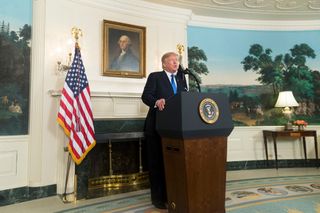Trump Stumps for AI R&D, Education

Add artificial intelligence (AI) to the list of things—5G, for another example—that the U.S. needs to be first in, according to President Donald Trump.
That is according to a new executive order, the Protecting the United States Advantage in Artificial Intelligence and Related Critical Technologies National Security Presidential Memorandum [NPSM], which the President issued on Monday (Feb. 11).
President Trump has directed that AI research be considered a priority, with relevant agencies required to identify annually to the Office of Management and Budget and the White House Office of Science and Technology Policy which programs need funding and how much they need.
That is based on the promise of AI to "drive growth of the United States economy, enhance our economic and national security, and improve our quality of life," said the President, who remains focused on winning, per the following "musts":
"(a) The United States must drive technological breakthroughs in AI across the Federal Government, industry, and academia in order to promote scientific discovery, economic competitiveness, and national security.
"(b) The United States must drive development of appropriate technical standards and reduce barriers to the safe testing and deployment of AI technologies in order to enable the creation of new AI-related industries and the adoption of AI by today's industries.
(c) "The United States must train current and future generations of American workers with the skills to develop and apply AI technologies to prepare them for today's economy and jobs of the future.
Multichannel Newsletter
The smarter way to stay on top of the multichannel video marketplace. Sign up below.
(d) "The United States must foster public trust and confidence in AI technologies and protect civil liberties, privacy, and American values in their application in order to fully realize the potential of AI technologies for the American people.
(e) "The United States must promote an international environment that supports American AI research and innovation and opens markets for American AI industries, while protecting our technological advantage in AI and protecting our critical AI technologies from acquisition by strategic competitors and adversarial nations."
Agencies that give out educational grants are directed to prioritize AI in those programs, including STEM programs, but with priority given to American citizens.
Government agencies are also directed to open access to computing resources to the non-federal AI computing community, while protecting security and privacy. The public will get a chance to weigh in on what access they need or how to improve AI R&D and testing.
Among the issues the executive order tees up are approaches, regulatory and nonregulatory, to technologies and industrial sectors empowered by AI and ways to reduce barriers to the use of AI.
The Department of Commerce is directed within 180 days to issue a plan for the development of technical standards for "reliable, robust, and trustworthy" systems that employ AI.
Sen. Roger Wicker (R-Miss.), chairman of the Commerce Committee, said the order will strengthen the U.S. global position, including by creating an AI-capable workforce.
“Artificial Intelligence has great potential to benefit the American people, while enhancing our nation’s security and growing our economy,” said Wicker in a statement. “Today’s executive order will ensure that the United States remains a leader in emerging technologies and scientific development. I look forward to working with the President to guarantee AI is fueled by American innovation, while protecting consumer data privacy and American values.”
“With AI growing at a rapid pace, we need to take action to ensure that our adversaries and near peers aren’t able to target this emerging tech and use it in malicious ways,” said House Homeland Security ranking member Mike Rogers (R-Ala.). “Today’s announcement demonstrates that President Trump recognizes that the United States cannot coast on our thriving innovation economy to maintain our leadership in AI, but must actively engage so that it does not become a threat to our national and economic security interests."
“The White House announcement today is a good step toward a national strategy for AI," said Software & Information Industry Association senior VP Mark MacCarthy. "We especially praise the White House’s emphasis on open data, which requires maintaining incentives for private sector developed data in government data sets. SIIA strongly supports the focus on oversight of AI as used in context rather than generic regulations.”
Contributing editor John Eggerton has been an editor and/or writer on media regulation, legislation and policy for over four decades, including covering the FCC, FTC, Congress, the major media trade associations, and the federal courts. In addition to Multichannel News and Broadcasting + Cable, his work has appeared in Radio World, TV Technology, TV Fax, This Week in Consumer Electronics, Variety and the Encyclopedia Britannica.

